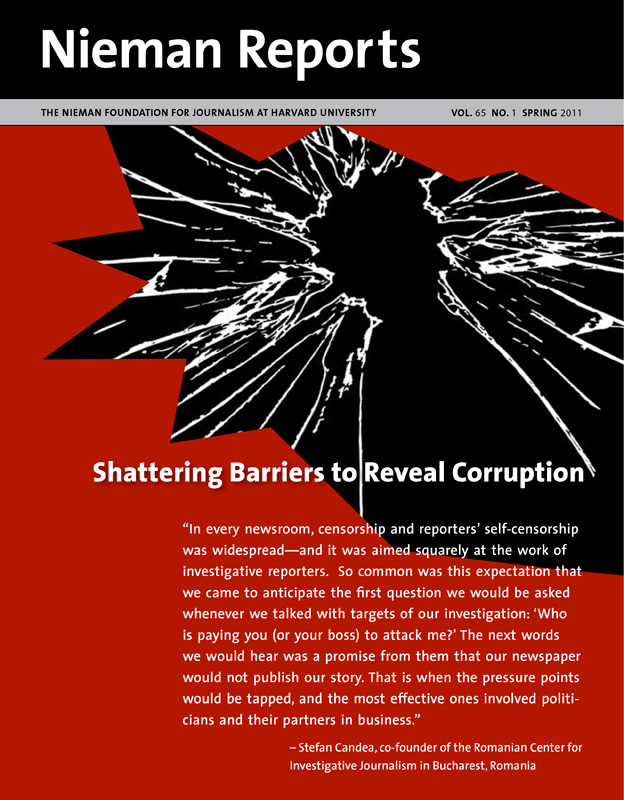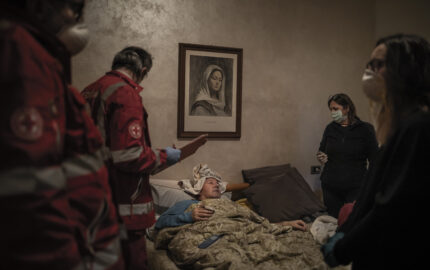
Investigative journalism in Poland is moderately young—only about 20 years old. After 1989 and the fall of Communism, new titles for journalists emerged and along with them a lot of intelligent and ambitious reporters who produced captivating investigative stories. Each year a few big publications revealed corruption in politics, sports organizations, medical institutions, shady businesses, or organized crime. The Grand Press Award for the best investigative story of the year was a big event with huge competition. However, about three years ago Polish investigative journalism started to die. Now, as the time of the Grand Press contest approaches, people wonder: Is there any investigative story that could be granted this prestigious award?
When someone calls me an investigative journalist, I say, "No, I am just a journalist who has worked on a few investigative stories." If asked how many investigative journalists there are in Poland, I answer, "None, even though many reporters have done some investigative stories."

When the president of Poland died in a plane crash in Russia, the Polish media focused on conspiracy theories—only a few investigated. Photo courtesy of the president’s office.
In 2006 my colleagues at "Superwizjer," a magazine show on Poland's commercial station TVN, investigated the Polish-Russian gas deal. It took them two years and travel to several countries to prepare a 30-minute film—"Russian Mafia, Polish Government and Gas." Today I don't know any Polish media outlet that would decide to do it. By "it" I refer to allowing journalists to work on one story for such a long time, paying them every month for material that will not be ready soon, plus covering all of their expenses for research, filming, traveling, establishing relationships, and meeting with sources. Nor would a news organization assume the risk of legal problems that would be encountered after such a story is published.
Is it not wiser to have those journalists prepare less revealing and less important news stories and produce those more often? Costs are lower and the product exists almost immediately. That is how most editors think these days so it is no surprise that of the four large Polish TV channels, only one carries a program with investigative stories.
However, the fault doesn't lie only with how editors think. The weak point in the Polish news media is that few journalists have employment contracts. I had an employment contract for only two years out of the decade I have been a journalist. Many reporters sign a monthly contract to perform a particular task. This gives them neither stability nor security; it also makes them struggle for every penny. And it affects the way managers assign stories—fewer, shorter, faster.
RELATED LINK
Resources for Investigative ReportersMany investigative journalists decided they didn't want to do essentially assembly-line production work on stories and switched to public relations work or what they call "strategic solutions." In a recent poll by the Institute for Media Monitoring (Instytut Monitorowania Mediów) and the Polish Journalists Association (Stowarzyszenie Dziennikarzy Polskich), 42 percent of the journalists who responded indicated that they were considering leaving the profession. Money was one factor; others included the media being political, attempts from outsiders to manipulate the media, and too many fellow journalists acting in unprofessional ways—by pursuing stories that are sensational, lacking adequate preparation for their jobs, copying and pasting the work of others, and ignoring the basics of reporting, such as needing two sources before publishing a story.
Newsroom Budgets
There are more questions to be answered about what happened with the president's plane. Most of the Polish news media sent reporters to Smolensk in Russia on the day of the catastrophe. Later, only two or three newsrooms allowed their journalists to go back to investigate the crash. (The others decided that it was too expensive.) While it might seem unbelievable, most stories about this tragedy—including the investigative ones—were prepared "behind the office desk."
"Superwizjer" is a proud exception. In 2010, the TV news program sent reporters, including me, to Russia a few times and prepared four stories related to the crash. We were given the resources—except for time, which was scarce—we needed to work on these stories. Our work brought very good results: I located eyewitnesses who proved to be crucial to the investigation. The first civilians to reach the crash site described what was happening there and confirmed that no one survived. (There was a rumor in Poland that some people survived the plane crash.)
At that time, the names of these eyewitnesses and their observations were unknown to Polish prosecutors. I also managed to receive some mobile phone videos taken by various witnesses who were there after the crash. Additionally, our findings disputed some conspiracy theories that were popular in Poland; the most popular one was that a person who took video of the crash site was later murdered, which was not true.
After my report was broadcast, a prominent Polish journalist wrote on Facebook: "Send Biel to Smolensk for a few months and she will find the reasons for the crash." Unfortunately, Russians handled the main investigation of the crash, and they shared very little information with Polish journalists. Nor were any Russian reporters working (or even willing to work) on this story so we could not count on the sources they might have had among the prosecutors. This situation meant that we could talk with witnesses, keep an eye on the Russian investigation, examine the rumors and conspiracy theories—given Poland's relations with Russia, there have been many—and dispute false ones.
The question is whether we did anything exceptional. We did the investigative work that reporters would do at the site of such an event. My colleagues spoke with the air controller who was working at the airport that day and did a flight simulation to see if the weather conditions really made it impossible to land. Since we were the only journalists who did so, it seemed like we had achieved something big.
Is the media situation really so bad in Poland that they cannot afford to send reporters to work in Russia—even on an important story like this one?

Newsroom Politics
Now we have come to the second reason for the dire circumstances of investigative journalism in Poland—the forceful and negative influence of politics. The Smolensk case offers a stark example of how political sympathies influence Polish journalism. Instead of researching and reporting news articles, journalists spent most of their time and energy in the first months after the catastrophe speculating about the involvement of various political parties and individuals in the plane crash.
In my newsroom, I have never experienced the manipulation or censorship of investigative stories for political reasons nor have any of the journalists with whom I work closely. Yet such situations do occur at TV news programs when journalists recognize which stories are considered politically "good" or "bad" and adjust their commentary accordingly. Most censorship is of an "inner" nature. Journalists self-censor because they are aware of their employer's political position and thus do not submit stories in opposition to it. I know of many journalists who sell their stories or write under false names for competitors because the other owner has a different political affiliation.
Right now most of the mainstream news organizations support the Polish government. Journalists rarely criticize it and officials who serve in it are given a lot of trust. When it comes to suspicions of illegal lobbying or corruption, many journalists are blind. In part, this is a remnant of behaviors learned when Jaroslaw Kaczynski, who did not hide his dislike of many journalists, was prime minister. Some politicians have confirmed the existence of a black list of journalists who were not to be talked with. An investigation is under way to find out if journalists, mainly investigative reporters, were being spied on back then through the monitoring of their phone calls and text messages.
Pressures on Journalists
When current Prime Minister Donald Tusk came into office, the atmosphere changed. Journalists became too lenient in their coverage of politicians. In the poll mentioned earlier, 92 percent of the respondents stated that they were pressured in their coverage. Though I find this percentage to be too high, I do know such situations happened, with pressure being exerted mainly by forces on the outside.
When some journalists I know did a big story on drug trafficking, they were asked by prosecutors to take special security precautions since there were threats made on their lives by organized crime bosses. Such threats are common. Journalists are pressured by people offering money and, let's put it straight, corrupting them. This practice begins with words like these, "Leave it. I will give you a better story than that." I experienced this situation twice, and it ended with money being offered or with promises of other avenues of financial profit. Unfortunately, I've heard of journalists who accepted such offers.
Pressure is also exerted on journalists when rumors are spread in an attempt to undermine their credibility. These rumors can be about a journalist's personal life or they can involve professional accusations. When the rumors are about work they can involve corruption or manipulation, including stories about working for and being paid by secret services or by foreign governments. One day I picked up a phone call from someone who wanted to warn me about a colleague I was working with who was, according to the caller, drug addicted, corrupt and using me as a cover for his shady businesses.
I do not care about other journalists' personal lives, as long as they do not influence our work. Since I work only with people I know very well or I work on my own and I always check all of the facts in my stories, I knew that the work we were doing together was beyond any suspicion. If I was to believe such rumors, then none of the journalists I know who work on investigative stories would be considered clean. I've heard such rumors about every one of the investigative reporters I work with, and I've heard rumors said about me, including one that I was working for the Russians. I am always very skeptical about hearing such accusations regarding fellow reporters, but there are many journalists who believe them and this can create feelings of antagonism among us.
I know these things happen. I've experienced some of them and I've heard firsthand about them from other journalists. However, I never hear anything said publicly about any of this. Why? In Poland there is no institution to support and protect journalists. The Polish Journalists Association exists but few journalists are members as it is considered very—no surprise—political. There is no national Polish journalists' trade union.
One more factor has an impact on Polish investigative journalism. We lack strong journalism education; this means reporters can't improve their qualifications. Very few journalists in Poland speak foreign languages, and as a consequence there is little or no international coverage. Digital technologies are not understood; most journalists don't even know about new media tools. Recently I asked colleagues about computer-assisted reporting and they had no idea what it is. How to encrypt messages and files remains a mystery to most journalists so almost no one does it. Nor are we supported with the new tools that could help us with database reporting, for example. This means that we are left to find ways to broaden our knowledge on our own, but it is hard to find anyone to help us.
I count myself among the fortunate since at the beginning of my professional life I met a master investigative journalist with whom I worked and from whom I learned so much. The need in Poland is great for a few journalists with investigative skills to act as mentors to the hundreds of students who want to be investigative reporters. The issue is whether enough journalists will step forward to teach the next generation how to develop sources, verify information, and analyze a database.
There is not a lot of reason for optimism, but I do see faint glimmers of hope. As experienced journalists realize the dire nature of this situation, then perhaps some will want to do what they can to change it. If such thinking results in action, then students might find masters to impart lessons, give them tools, and offer practical experience that will give them the start they need to become good investigative journalists. If? "If" is a tiny word—with a big weight of possibility riding on its shoulders.
Beata Biel is a journalist and TV producer based in Krakow, Poland. In 2008 she received a Grand Press Award for the best TV documentary of the year; she was nominated again the following year. She is a 2011 Transatlantic Media Fellow at the Center for Strategic and International Studies in Washington, D.C.


